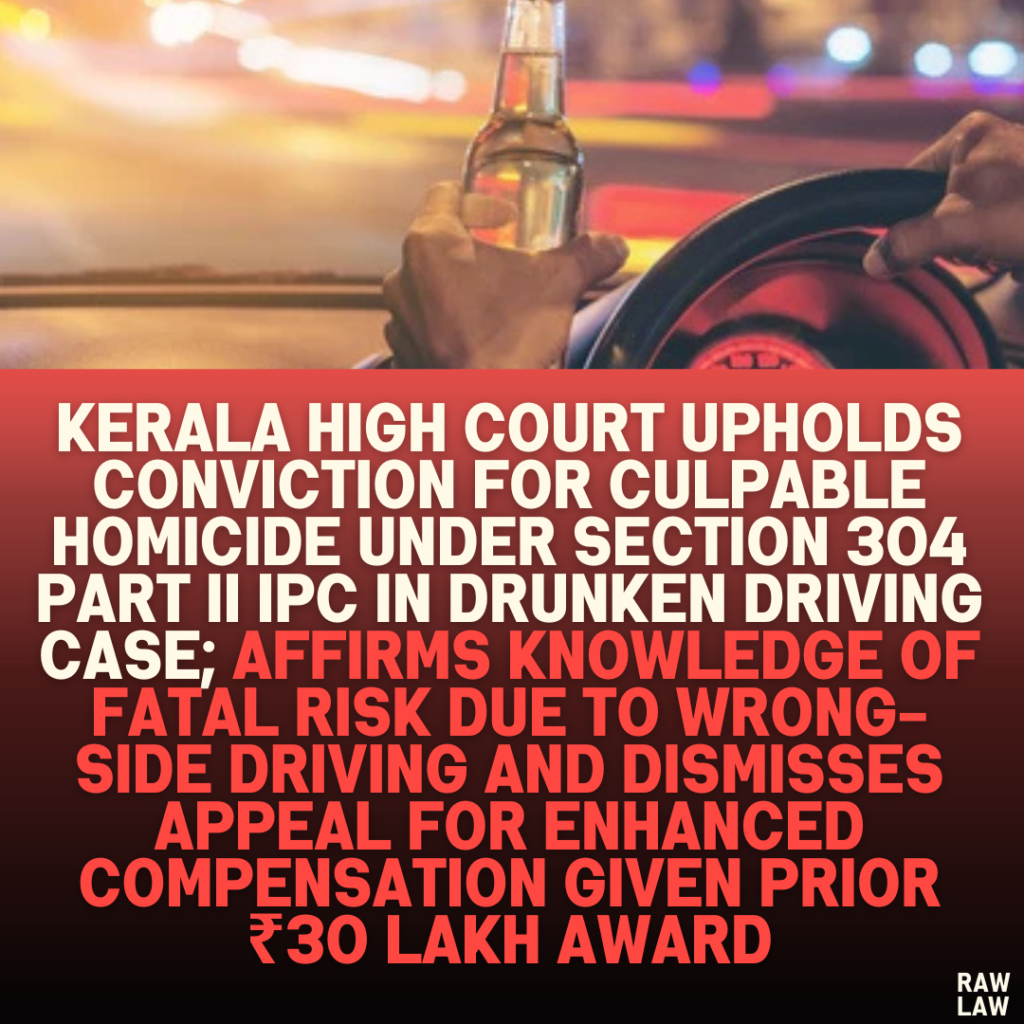Court’s Decision: The Kerala High Court dismissed both the criminal appeal by the accused and the appeal by the victims for enhanced compensation, upholding the trial court’s judgment convicting the accused of culpable homicide not amounting to murder under Section 304 Part II IPC and sentencing him to three years of rigorous imprisonment along with a fine of ₹25,000. The court observed that the accused, who was driving under the influence of alcohol, exhibited reckless conduct with knowledge that his actions were likely to result in death.
Facts of the Case:
On May 6, 2013, the deceased was riding a motorbike with his wife and son as pillion riders on a public road in Kozhikode when a car, driven by the accused on the wrong side and allegedly under the influence of alcohol, collided with the motorbike. The impact caused the death of the motorcyclist on the spot, with his wife and son sustaining injuries. Following an investigation, the accused was charged with offenses under Sections 304 Part II and 337 IPC, as well as Section 185 of the Motor Vehicles Act for drunken driving.
Issues:
- Whether the prosecution successfully established that the accused committed culpable homicide not amounting to murder under Section 304 Part II IPC.
- Whether the actions of the accused amounted only to negligence under Section 304A IPC or constituted culpable homicide.
- Whether the victims’ appeal for enhanced compensation was valid and maintainable.
Petitioner’s Arguments:
The accused’s counsel argued that the evidence only established rashness or negligence, making Section 304A IPC applicable. They contended that the trial court erred in attributing culpable homicide under Section 304 Part II IPC, citing precedents to support their position that without intent, the graver charge was unwarranted.
Respondent’s Arguments:
The Public Prosecutor argued that the accused, driving on the wrong side in a drunken state, exhibited reckless disregard for life, thus fulfilling the knowledge requirement under Section 304 Part II IPC. The prosecution maintained that the evidence, including witness testimonies and forensic reports, showed the accused’s behavior was beyond mere negligence.
Analysis of the Law:
The court analyzed the definitions and applications of Sections 304 Part II and 304A IPC, emphasizing that Section 304 Part II requires an element of knowledge or intent in the act that is likely to cause death, whereas Section 304A applies to cases of rash or negligent acts without such knowledge or intent. The court reviewed previous judgments that clarified the legal boundaries of culpable homicide versus negligence in driving cases.
Precedent Analysis:
The court referred to judgments such as State of Gujarat v. Haidarali Kalubhai and Alister Anthony Pareira v. State of Maharashtra, underscoring that knowledge of potential fatal outcomes due to reckless behavior—especially when intoxicated—fulfills the threshold for culpable homicide. This analysis reinforced that, given the accused’s reckless and drunken driving on the wrong side, the case met the criteria under Section 304 Part II IPC.
Court’s Reasoning:
The court found that the evidence, including the accused’s blood alcohol level (significantly above legal limits) and his driving behavior, established that he drove with the knowledge that his actions were likely to cause death. The court noted that the accused offered no explanation for driving on the wrong side, nor did he refute witness testimonies indicating his impaired state and erratic driving. The court emphasized that such knowledge aligns with the requisite mental state under Section 304 Part II IPC.
Conclusion:
The High Court concluded that the trial court’s findings were legally sound, affirming the conviction under Section 304 Part II IPC, as the accused’s behavior went beyond mere negligence, aligning with culpable homicide. The court dismissed the victims’ appeal for enhanced compensation, reasoning that a separate award of ₹30 lakhs had already been provided by the Motor Accident Claims Tribunal, satisfying the compensation requirement.
Implications:
This judgment underscores the Kerala High Court’s stance on the gravity of drunken driving cases where fatalities occur, reinforcing the precedent that such acts, when accompanied by knowledge of likely fatal outcomes, qualify as culpable homicide under Section 304 Part II IPC. It also highlights the limitations on compensation appeals by victims when adequate relief has been provided by another tribunal.
